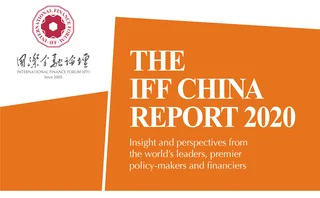
Hungry like the wolf


‘‘The wolf is coming” – which is how some foreign institutions, set to compete in China for the first time, describe China’s capital market as it finally opens up to the rest of the world.
This latest opening-up is both comprehensive and bilateral. First, capital market financial services – including securities companies and even private equity firms – will be able to accept foreign capital. According to a notice from the China Securities Regulatory Commission (CSRC), ownership limits of qualified foreign investors in foreign-invested futures companies has been relaxed to 51% and will be fully removed in three years.

Second, barriers on capital flows will be gradually removed. In 2012, the Qualified Foreign Institutional Investor (QFII) and Renminbi Qualified Foreign Institutional Investor programmes were implemented, followed by the Shanghai–Hong Kong Stock Connect and Shenzhen–Hong Kong Stock Connect programmes. Soon, China will also have access to the Shanghai–South China Connect and Sino–Japan ETF [exchange-traded fund] Connect programmes. International capital will also be able to enter China’s domestic capital market through mutual recognition of funds. This current all-round opening up is completely different from the past.
The move to phase three
China’s opening-up can be divided into three phases. The first phase began in the late 1980s. From 1989 to early 1990, China allowed Chinese companies to list overseas to attract foreign capital – although there was a red line that could not be crossed on the flow of international capital: foreign capital could only invest in those overseas-listed Chinese companies.
In the second phase, China has liberalised the QFII system since 2012, allowing foreign capital to enter the country to a degree. But QFII had a quota control, and had to be approved and managed accordingly by the State Administration of Foreign Exchange.
Now China is in the third phase – its capital market finally opening up fully. The foreign equity ratio and foreign firm access will be widened, and restrictions lifted. For example, the QFII quota control is likely to be cancelled soon. Regions such as Taiwan that employ the QFII system will see its removal within two or three years. In this regard, the ‘wolf’ really is coming.
However, global capital markets should continue to pay attention to the fragility and instability of the US financial system. Following the global financial crisis of 2007–08, the Federal Reserve Board introduced the policy of quantitative easing, effectively bailing out the market. As a result, the US government bought between $3.5 trillion and $4 trillion worth of toxic assets such as collateralised debt obligations and credit default swaps from commercial banks and investment banks. Now the US central bank cannot either reduce or erase its balance sheet, and nothing has been achieved over the past decade. How can these toxic assets be digested? There is a big hole in the American financial system.
In addition, the US stock market still looks as though it is in a bubble. Since taking office, President Donald Trump has not allowed the US stock market to decline even by the tiniest fraction. The basic indicators for measuring the stock market bubble are the price-to-earnings (P/E) and price-to-book-value (P/B) ratio. Since 2015, the P/E ratio of the US stock market has continued to soar. For example, the current P/E ratio of the Dow Jones and Standard & Poor’s 500 is close to 20, and their P/B ratio is about 3. The Nasdaq now has a P/E ratio of around 38–40 and a P/B ratio of 4. Whether it is measured from the P/E or P/B ratio, the US stock market is tracking within a dangerous range.
Then there is the trade conflict – an additional source of friction for China–US relations – which is now known as the ‘China–US decoupling’. Decoupling is having a deleterious effect on the global economy. What China wants is win-win co‑operation instead of decoupling, but it is the US that will be affected worse by hard decoupling and continued trade frictions. The interdependence of China and the US’s economies is reflected in global capital markets, where the US capital market is more dependent on China.
US stock market data reveals that IT accounts for 25% of its value – close to $11.3 trillion. The remainder is made up of financials (14.46%), consumables (13.76%), healthcare (11.88%) and others. Technology – namely Apple, Microsoft and Amazon – makes up the lion’s share of the US stock market’s capitalisation. Technology companies rely heavily on China, the largest consumer of US tech products, including electronics, computer operating systems, and software and chip technology. The China–US trade friction may lead to an economic slowdown in the US, which will cause a series of problems in the capital market.
Two important lessons
China must open up its capital market even further. But in this process, there are two lessons to be learned.
First, the ‘catfish effect’ – the theory that strong competitors force weaker ones to improve – is often referred to when considering lifting restrictions on foreign investment: opening-up will promote competition. But we can learn from the cases of other emerging economies that what really happens after opening up is the ‘alligator principle’ – the more you struggle, the more you are bitten. When financial services were fully opened up in emerging economies, foreign capital – especially US capital – defeated all the local financial institutions. When trading H‑shares in Hong Kong in 1990, I dealt with investment banks that were all British-owned. But, after China launched H‑shares in 1992, the US investment banks discovered that it was a huge market, rushing into the Hong Kong market one after another. As a result, most of the investment banks in Hong Kong today are US companies. It is the same in Japan and the Republic of Korea. We must therefore avert the alligator principle.
Second, opening-up may impact on international capital flows – what is known as the ‘fleecing of the flock’, or by Chinese A‑share investors as ‘leek harvesting’. Since the implementation of QFII in 2012, a total of CNY120 billion successively entered Chinese markets before major abnormal volatility occurred in 2015. During the same year, foreign capital withdrew from the A‑share market, taking with it nearly CNY170 billion. Currently – although the stock market is faltering – foreign capital is still pouring in. According to the China Securities Finance Corporation, as of November 15, from the fund flow into the mainland China stock market from Hong Kong via the Shanghai–Hong Kong Stock Connect and Shenzhen–Hong Kong Stock Connect programmes, the net purchase amount of the A-shares has totalled around CNY880 billion. The market value of these shares purchased and held is nearly CNY1.3 trillion. The A-share stock market is not performing, but foreign capital is still making money. Of course, the composition of foreign capital is more complicated, but is still flowing into China from overseas.
These lessons should be borne in mind when opening up markets – and especially the capital market – to foreign capital.
Only users who have a paid subscription or are part of a corporate subscription are able to print or copy content.
To access these options, along with all other subscription benefits, please contact info@centralbanking.com or view our subscription options here: subscriptions.centralbanking.com/subscribe
You are currently unable to print this content. Please contact info@centralbanking.com to find out more.
You are currently unable to copy this content. Please contact info@centralbanking.com to find out more.
Copyright Infopro Digital Limited. All rights reserved.
As outlined in our terms and conditions, https://www.infopro-digital.com/terms-and-conditions/subscriptions/ (point 2.4), printing is limited to a single copy.
If you would like to purchase additional rights please email info@centralbanking.com test test test
Copyright Infopro Digital Limited. All rights reserved.
You may share this content using our article tools. As outlined in our terms and conditions, https://www.infopro-digital.com/terms-and-conditions/subscriptions/ (clause 2.4), an Authorised User may only make one copy of the materials for their own personal use. You must also comply with the restrictions in clause 2.5.
If you would like to purchase additional rights please email info@centralbanking.com test test test







